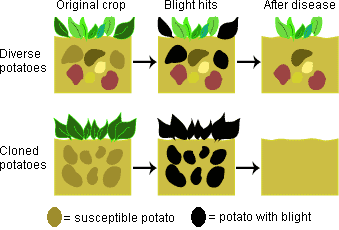In agriculture, monoculture is the practice of relying extensively on one crop with little biodiversity. In the 1840s, a famine in Ireland was caused by a disease that hit potatoes, the crop on which Irish people largely relied. At Understanding Evolution, an article reads:
The Irish potato clones were certainly low on genetic variation, so when the environment changed and a potato disease swept through the country in the 1840s, the potatoes (and the people who depended upon them) were devastated.
The article includes this illustration of how monocultures are vulnerable:
The Irish potato famine reveals how choices about how to feed populations, combined with biological realities, can have dramatic impacts on the world. In the three years that the famine lasted, one out of every eight Irish people died of starvation. Nearly a million emigrated to the United States, only to face poverty and discrimination, in part because of their large numbers.
The article continues:
Despite the warnings of evolution and history, much agriculture continues to depend on genetically uniform crops. The widespread planting of a single corn variety contributed to the loss of over a billion dollars worth of corn in 1970, when the U.S. crop was overwhelmed by a fungus. And in the 1980s, dependence upon a single type of grapevine root forced California grape growers to replant approximately two million acres of vines when a new race of the pest insect, grape phylloxera (Daktulosphaira vitifoliae, shown at right) attacked in the 1980s.
Gwen adds: The Irish potato famine is also an example of a reality about famines that we rarely discuss. In most famines there is food available in the country, but the government or local elites do not believe that those who are starving have any claim to that food. In the years of the Irish potato famine, British landowners continued to export wheat out of Ireland. The wheat crop wasn’t affected by the potato blight. But wheat was a commercial crop the British grew for profit. Potatoes were for Irish peasants to eat. We might think it would be obvious that when people are starving you’d make other food sources available to them, but that’s not what happened. In the social hierarchy of the time, many British elites didn’t believe that starving Irish people had a claim to their cash crop, and so they continued to ship wheat out of the country to other nations even while millions were dying or emigrating. Similarly, in the Ethiopian famines of the 1980s, the country wasn’t devoid of food; it’s just that poor rural people weren’t seen as having a right to food, and so available food was not redistributed to them. Many people in the country ate just fine while their fellow citizens starved.
So famine is often as much about politics and social hierarchies as it is about biology.


Comments 9
Elena — January 23, 2009
This issue also affects bananas, of all things. They are almost invariably seedless, so you get new trees by planting cutings from others. They are effectively clones of each other, and the genetic diversity of each variety is very nearly zero.
There has been already a case when a variety has been almost completely wiped out: the Gros Michel bananas succumbed to Panama disease in the 1950s.
joe smith — January 23, 2009
in the early days of mass deforestation in the pacific north west, the only type of tree planted in the cuts was a single cultivar of pine. Now we have the Mountain Pine beetle and >60% of the trees in british columbia are standing dead... it's very, very sad that we are still so short sighted.
Sanguinity — January 23, 2009
Re cash crops vs. food-for-locals crops, and how other facets of modern food production lead to starvation, Raj Patel's Stuffed and Starved is an excellent source.
T B — January 23, 2009
> "famine is often as much about politics and social hierarchies as it is about biology"
Those interconnections are stressed in Murray Bookchin's "Social Ecology" analysis. (This term I'm in a Sociology graduate reading course about Bookchin.)
There's an exerpt from an article about banana monocrops in this blog post -
"Corporate bananas" ( http://tobanblack.net/blog/?p=220 )
chuk — January 23, 2009
Whoa whoa whoa. Joe Smith!
I do research on forestry and silviculture in the Pacific North West. I've suspected your claim for some time, but have never found anything that reports this. If you have a citation, or an avenue for finding information on this, please let me know :)
chuk_here@hotmail.com
chuk — January 23, 2009
Oh. And to follow up on Joe Smith's comment. When forests go down as they are now in the Pacific North West, the communities go down with them. When it takes 60-70 years, even 150 years, to regenerate these resources, the importance of these crops and their proper management is readily apparent.
thewhatifgirl — January 27, 2009
Wasn't there also a British mandate that industrialization was not allowed in Ireland, thus requiring the poor to either work in agriculture or not at all, further forcing them to depend on food that they grew for themselves because they didn't have the cash and/or couldn't afford to buy food?
Different Types Of Beetles Grape Vine Beetle New Vw Beetle Parts | Ff7Victory — February 16, 2009
[...] bettles - GardenBanter.co.ukRappahannock Cook & Kitchen Gardener » Growing Chayote in VirginiaYahoo! 360° - Jessie's Blog - Passionate WednesdaySociological Images » MONOCULTURES, GENETIC DIVERSITY, AND THE … Various NOS VAG parts for [...]
The Cross and the Cactus | Including But Not Limited To... — March 21, 2014
[…] scope and intensity of these tragedies are often the result of human behavior. For example, compulsory monoculture led to, just to name one, the Irish potato famine. Likewise, domestication, urbanization and […]